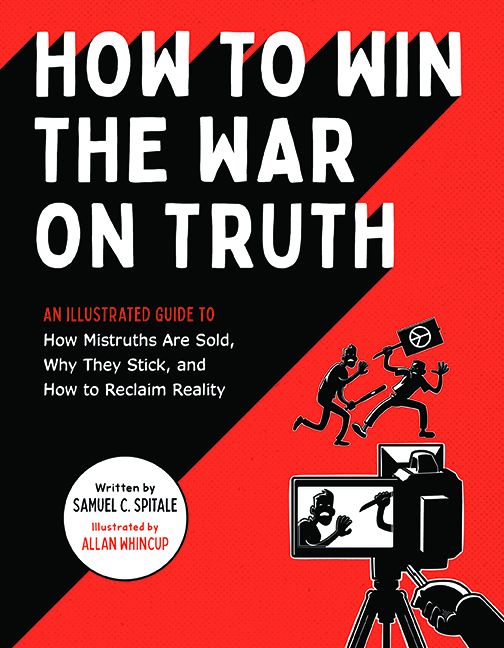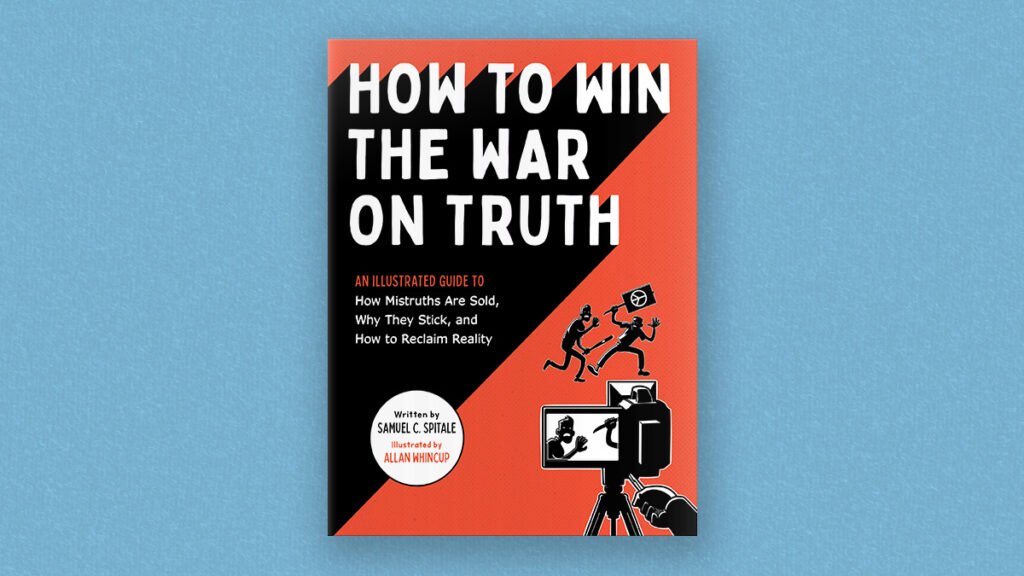3 Common Thanksgiving Tough Talking Points and How to Handle the Conversation, from the author of How to Win the War on Truth
It’s that time of year again, where sensible people across the country arm themselves for an ideological battle. No, it’s not a War on Christmas (which doesn’t exist, by the way), but a War on Truth—a battle between fact and fiction, truth and myth, and on display over Thanksgiving tables across the country.
This year I offer a survival guide to help steer loved ones (bless their hearts!) away from the propaganda minefields of social media, cable news, and talk radio.
For the well-meaning parents misinformed on pressing issues:
Sorry, Mom and Dad, but no, the COVID boosters and vaccinations won’t give you cancer or make you infertile. They are perfectly safe.
Whatever you may have heard about the COVID-19 vaccines, if the info did not come directly from the CDC, then chances are you should just ignore it. The next-door neighbor, though well-intentioned, does not have a PhD in infectious diseases, nor has she dedicated her life to science. Only listen to those with the relevant credentials, please!
Prior to popular belief—and I cannot stress enough the word belief—COVID vaccinations do not contain microchips or magnets, nor do they alter your DNA. To debunk any and all vaccine myths, please visit the CDC website. (Besides, if the vaccinations are good enough for all living presidents, past and present, then it’s probably safe for you too!)
Plus, you may recall that I had to get immunized against polio, meningitis, tuberculosis, tetanus-diphtheria, chickenpox, hepatitis, and measles, mumps, and rubella as a requirement to attend college—and none of us batted an eye. We simply did our part to keep the community (and me) safe from these nearly eradicated diseases.
So please, for the love of your family, get all the COVID vaccinations and flu shots that you are eligible for. (I’m talking to you, Mother!) That way, if we get sick this holiday season, it will only be from the common cold, and we won’t clog up hospital rooms from those who need them. (True story: last year over Christmas, my mom, my brother, three cousins, and I were all sick from colds and sinus infections. The only family member who did not feel sick was my stepdad—and he was the only one who tested positive for coronavirus! Thankfully, he had gotten the booster just a few weeks earlier. #VaccinesWork!)
For the suspicious and conspiracy-prone great aunt:
No, Aunt Edna, those meager stimulus checks from two years ago did not cause inflation!
Considering how many people were out of work and not earning a regular salary in 2020, those checks barely covered a month’s rent. Thus, they had no influence on 2022. The rampant inflation we are currently experiencing is not a problem limited to the U.S. It is a global crisis, impacting countries across the world. It’s even worse in the U.K., where the inflation rate is 10.1% compared to the U.S. rate of 8.2%. The Organization for Economic Cooperation and Development (OECD) lists 23 countries with higher inflation rates than the U.S.
While inflation is at a 40-year high, corporate profits are at a staggering 70-year high. Since 1980, price markups—the difference between a product’s retail price and how much it costs to make—have tripled, rising from 21% above cost to 61%. These inflated prices mean a greater transfer of wealth from consumers to corporations, further contributing to U.S. inequality and driving runaway inflation.

According to economist and former secretary of labor Robert Reich, inflation is not being driven by wage increases, government spending, or any of President Biden’s economic policies. It is partly driven by supply-chain issues left over from the pandemic, partly by the Russian invasion of Ukraine, but primarily, it’s a result of corporate greed. According to Reich, the only way to fight inflation is to regulate the market and control prices, enact a windfall profits tax to curb price gouging, and enforce antitrust laws to reduce monopoly power so that the market is more competitive. Like most problems, it’s helpful to consider who profits from the problem (i.e., corporations), not who suffers from them (i.e., consumers).
For the uncle who lives in a fake news echo chamber:
No, Uncle Bob, the 2020 election was not stolen. (sigh)
Despite claims made by former President Trump—a man found to have lied more than 30,000 times while in office, averaging roughly 21 lies a day—he did not win the 2020 election.
If millions of fake ballots had actually been cast for Biden in 2020, then why did so many Republican legislators win office? Why would fake ballots favor Biden for president, but not fellow Democrats for Congress, Governor, and local legislatures? Why would anyone intent on committing election fraud only commit fraud on a single line in the ballot? To put it simply, they wouldn’t. And they didn’t. Period.
Out of the 136 million votes cast in the 2016 election, there were only four cases of fraud, or 0.000003 percent. In 2020, six known cases surfaced. As Robert Draper documents in Weapons of Mass Delusion, these six instances were all by registered Republicans: “Three occurred in the conservative central Florida retirement community known as the Villages. Each of the residents voted both in Florida and out of state. The other three alleged fraudsters lived in Pennsylvania. One 71-year old man was arrested for attempting to vote twice—the second time in disguise, pretending to be his son. The other two men, aged 67 and 70, were each caught attempting to cast a ballot for their deceased mothers. All six of them were registered Republicans, as was a seventh: Trump’s Chief of Staff Mark Meadows, who registered to vote in 2020 using the address of a mobile home in Scaly Mountain, North Carolina, that he apparently never once stayed in.”
Widespread voter fraud simply doesn’t exist. It’s long been a rallying cry anytime voter turnout did not favor that of wealthy white property owners—the only people in the U.S. who were originally allowed to vote. At the time of the country’s inception, voting was viewed as a privilege, not a right. Thus, once Black people were granted the vote in the 1800s, white property owners invented voter restrictions like literacy tests and poll taxes on the grounds that newly freed slaves could not be trusted to vote because they would shift the balance of power and enrich themselves at white people’s expense. These tactics remained legal until the Voting Rights Act of 1964.
Today, each time voter turnout is strong among minorities, as it was during the Obama elections, the more likely states are to restrict voter access on the grounds of “voter integrity.” This includes purging the voter rolls, reducing the number of polling locations and reducing their hours of operation, not allowing same-day registration, instituting voter ID laws, and limiting early voting and mail-in voting. When these tactics fail to suppress minority votes, the idea of voter fraud makes a comeback.
In conclusion:
I hope this survival guide helps you and your family win your own holiday war on truth. But if all else fails, just turn the table discussion to something everyone can agree on, like football. Or religion. 😀
For more tips on how to debunk falsehoods and misinformation, read more in my book How to Win the War on Truth: An Illustrated Guide to How Mistruths Are Sold, Why They Stick, and How to Reclaim Reality.
Get the Book
Samuel C. Spitale
Samuel C. Spitale is a media studies expert who has written for Huffington Post, as well as Geek magazine and Advocate.com. Previously, he worked at Lucasfilm Ltd. in global product development. He is the author of Star Wars: Collecting a Galaxy.
Allan Whincup is a former art director who works as a freelance illustrator and designer. His projects include logo design, character design, storyboarding, and creating assets for animation. He has also worked on games, CD covers, and comics.





